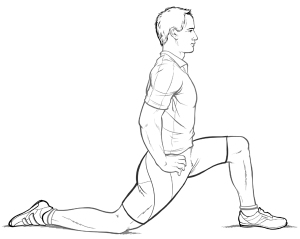Post-ride stretching converts your valuable exercise into flexibility
and stable posture. Vanessa Lougoon selects a super six collection
of static stretches for maximum effect in minimal time.
Workload guidelines
> Perform each stretch two times each for 20–30 seconds for each stretch. (If time is limited perform only one set.)
> Gently move into each position until you feel a moderate-to-strong stretch.
> Take regular, full breaths to achieve a deeper stretch.
> Any abnormal or persistent pain should be investigated by a physiotherapist or a doctor.

Hamstrings
Starting Position
From standing position, place one foot on a step.
Procedure
Keeping your knee and back leg straight, rock your trunk forward from the hips until you feel a stretch in the back of your thigh and knee.
Coaching Keys
If you only feel the stretch behind the knee, bend knee slightly and rock further forward until you feel the stretch in the hamstring. Keep your back straight, hips level and squared, and the foot of the standing leg straight. If you cannot maintain good form, decrease height of step.
Advanced Stretch
Increase step height.

Hip flexors and quads
Starting Position
In lunge position – with the leg to be stretched behind you.
Procedure
Gently lean forward until you feel a stretch at the front of your hip and quads. Contract buttocks and maintain neutral curve in lower back to increase stretch intensity.
Coaching Keys
Keep hips level and squared. Place a pillow under knee if necessary.
Advanced Stretch
When back knee contacts ground, lift the back foot off the ground and hold.

Gluteals
Starting Position
Lying on your back, bring your knee towards the opposite shoulder while keeping the opposite leg straight.
Procedure
Use hands to bring knee towards your body until you feel a stretch in the buttocks.
Coaching Keys
Keep shoulders relaxed and head on the floor. If the position is too difficult, guide the knee to the shoulder on the same side. If experiencing back pain, bend the resting leg.
Advanced Stretch
Rotate further by grabbing the ankle and pull towards body.

Trunk rotation & lower back
Starting Position
Lie on your back with one knee bent and the other straight with your arms to the side and palms facing up.
Procedure
Rotate hip so that the bent leg rolls over the straight leg, until you feel a moderate stretch in your lower back.
Coaching Keys
Keep both shoulders on the ground at all times.
Advanced Stretch
Place the hand opposite the bent leg on the bent knee and push down (keeping your shoulders on ground).

Pectorals (chest)
Starting Position
Standing in a doorway with forearm against the frame with elbow bent at 90 degrees.
Procedure
Lean your body forward until you feel a stretch across your chest.
Coaching Keys
Keep shoulders squared (avoid rotating shoulders).
Advanced Stretch
Perform with both arms at the same time.

Upper trapezius & neck
Starting Position
Sitting straight with one arm either a) sitting on your hand or b) holding the chair bottom or chair leg with your hand.
Procedure
Tilt head laterally to the opposite side and use your free hand to push head to increase neck stretch.
Coaching Keys
Push head to increase neck stretch. Pulling the hand under the chair will increase stretch in upper trapezius.
Advanced Stretch
Rotate head so that chin points to opposite shoulder and pull with hand from behind the head.
Extra Tips
> If you experience that one side of the body has significantly less flexibility than the other, perform an extra set on this side until even.
> You can perform these stretches at work such as in a meeting room.
> There are many ways to increase flexibility, so if you find the above stretches uncomfortable or not getting any effect, seek an alternative for that muscle group.
Vanessa Lougoon is an accredited exercise physiologist and high performance consultant. She specialises in injury management, athletic preparation and chronic disease management through exercise and lifestyle intervention. inspiredperformancetoday.wordpress.com
Ride On content is editorially independent, but is supported financially by members of Bicycle Network. If you enjoy our articles and want to support the future publication of high-quality content, please consider helping out by becoming a member.

Like you site
Great information! I will do these exercises to make my body strong and prevent injury. I hope these static stretches will help me.